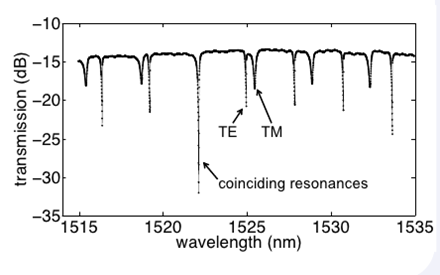|
| |
TE/TM biosensors for measuring conformational changesResearch Area:
Lab-on-a-chip label-free biosensors Main Researcher: Jan-Willem Hoste
Traditional ring resonator sensor have the disadvantage that they only measure total mass, and therefore cannot make a distinction between a thin dense layer and an equivalent thick less dense layer. Therefore, they are insensitive to conformational changes (changes in shape) of biomolecules.
By designing the rings such that they support two polarisations, we can perform two measurements which allows us to separately measure refractive index and layer thickness.
This opens up important applications in the fields of drug discovery and fundamental research

Other people involved: PublicationsInternational Journals
-
A. Van Eeghem, S. Werquin, J.F.I.B Hoste, A. Goes, E. Vanderleyden, P. Dubruel, P. Bienstman,
Double positive effect of adding hexaethyelene glycol when optimizing the hybridization efficiency of a microring DNA detection assay, Applied Surface Science, p.321-328 doi:10.1016/j.apsusc.2017.02.064 (2017)
 . . -
J.W. Hoste, S. Werquin, T. Claes, P. Bienstman,
Conformational analysis of proteins with a dual polarisation silicon microring, Optics Express, 22(3), p.2807-2820 doi:10.1364/oe.22.002807 (2014)
 . .
Back to overview
|
